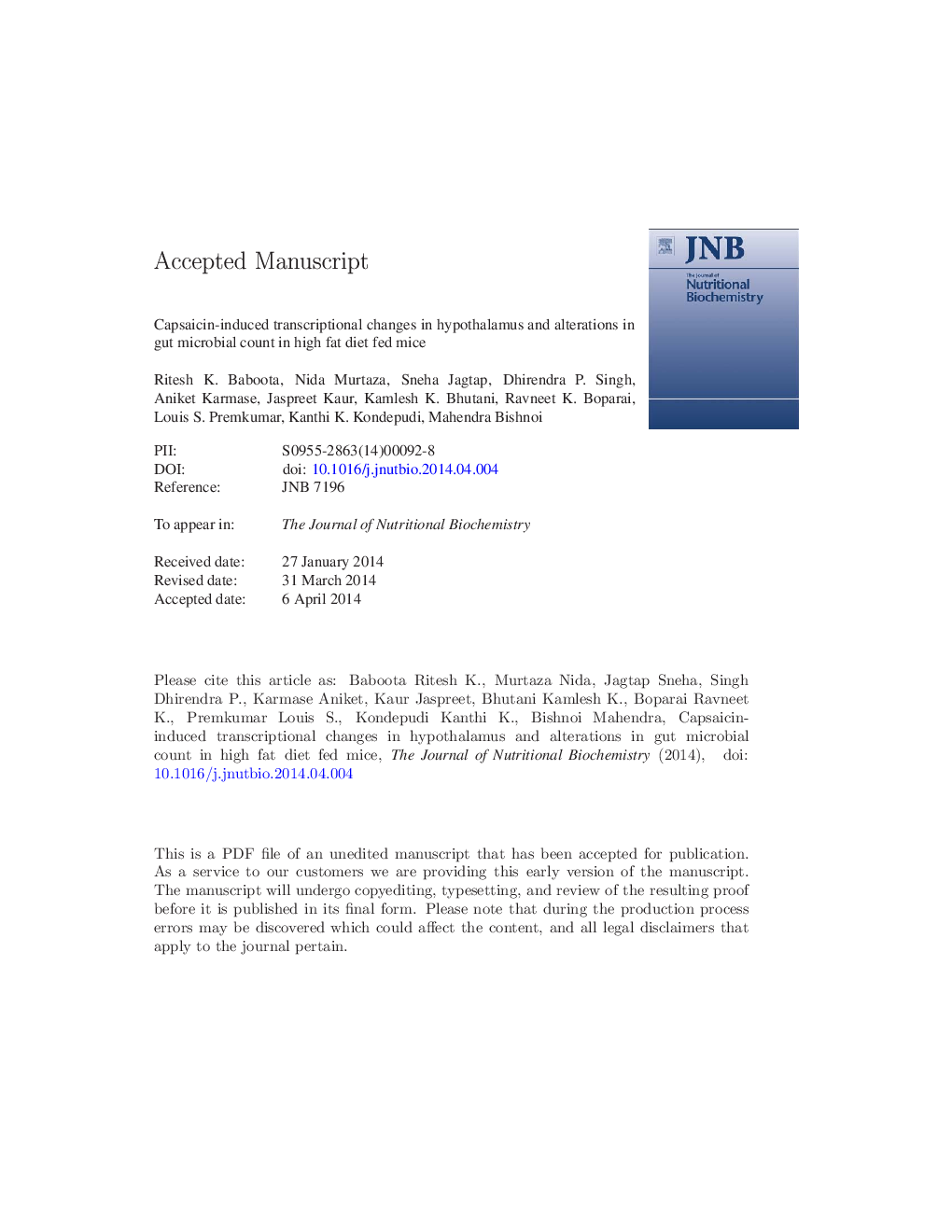| کد مقاله | کد نشریه | سال انتشار | مقاله انگلیسی | نسخه تمام متن |
|---|---|---|---|---|
| 8337142 | 1540657 | 2014 | 39 صفحه PDF | دانلود رایگان |
عنوان انگلیسی مقاله ISI
Capsaicin-induced transcriptional changes in hypothalamus and alterations in gut microbial count in high fat diet fed mice
ترجمه فارسی عنوان
تغییرات رونویسی ناشی از کپسایسین در هیپوتالاموس و تغییرات در تعداد میکروبی روده در رژیم غذایی با چربی تغذیه شده با موش
دانلود مقاله + سفارش ترجمه
دانلود مقاله ISI انگلیسی
رایگان برای ایرانیان
کلمات کلیدی
HprtSORT1IL1R1NR3C1AdipoR1acyl-CoA oxidase 1PGC1αIAPPNRP1IL1ASirt1NMBADCYAP1R1sirtuin 1ADRA2bPtgs2DRD2NTSR1NCOA1glucuronidase betaMitogen-activated protein kinase 14RAMP3gpd1NPY1RMCHR1NTRK2LEPneuromedin BGalR1actin, betaINSRMAPK14UCNGHRLGUSBNPYPOMCGAPDHACOX1ADIPOQPPARαCCKADIPOR2GRPPYYCNR1HcrtGHSRTRPV1BDNF - BDNF یا فاکتور نورونزایی مشتقشده از مغز cpd - CPDUcp1 - UCP1peroxisome proliferator-activated receptor alpha - آلفای گیرنده پرولیفراتور فعال فعالfatty acid synthase - اسید چرب سنتازInterleukin 1 alpha - اینترلوکین 1 آلفاAnti-obesity - ضد چاقیbrain derived neurotrophic factor - عامل مغز استخوان مغز استخوان استActb - عملFasn - فسادLeptin - لپتین Gut microflora - میکرو فلور رودهHypothalamus - هیپوتالاموسHypocretin - هیپوکراتینhypoxanthine-guanine phosphoribosyl transferase - هیپوکسانتین-گوانین فسفریبوسیل ترانسفرازuncoupling protein 1 - پروتئین جدا سازی 1prostaglandin-endoperoxide synthase 2 - پروستاگلاندین اندپورکسید سنتاز 2Islet amyloid polypeptide - پلی اتیل اتیل آمیلوئیدpeptide YY - پپتید YYcholecystokinin - کولهسیستوکینینCapsaicin - کپسایسین یا کاپسیسینCidea - کیدGastrin releasing peptide - گاسترین پپتید را آزاد می کندGhrelin - گرلینglyceraldehyde-3-phosphate dehydrogenase - گلیسرالیدید-3-فسفات دهیدروژنازGlycerol-3-phosphate dehydrogenase 1 - گلیسرول 3-فسفات دهیدروژناز 1adiponectin receptor 1 - گیرنده adiponectin 1dopamine receptor D2 - گیرنده Dopamine D2adiponectin receptor 2 - گیرنده آدوبونکتین 2insulin receptor - گیرنده انسولینgrowth hormone secretagogue receptor - گیرنده ترشح هورمون رشدneurotensin receptor 1 - گیرنده نورونسین 1Melanin-concentrating hormone receptor 1 - گیرنده هورمون متمرکز کننده ملانین 1Galanin receptor 1 - گیرنده گالانین 1Neuropeptide Y - یوروپروتئین Y
موضوعات مرتبط
علوم زیستی و بیوفناوری
بیوشیمی، ژنتیک و زیست شناسی مولکولی
زیست شیمی
چکیده انگلیسی
Obesity is a global health problem and recently it has been seen as a growing concern for developing countries. Several bioactive dietary molecules have been associated with amelioration of obesity and associated complications and capsaicin is one among them. The present work is an attempt to understand and provide evidence for the novel mechanisms of anti-obesity activity of capsaicin in high fat diet (HFD)-fed mice. Swiss albino mice divided in three groups (n=8-10) i.e. control, HFD fed and capsaicin (2Â mg/kg, po)+HFD fed were administered respective treatment for 3Â months. After measuring phenotypic and serum related biochemical changes, effect of capsaicin on HFD-induced transcriptional changes in hypothalamus, white adipose tissue (WAT) (visceral and subcutaneous), brown adipose tissue (BAT) and gut microbial alterations was studied and quantified. Our results suggest that, in addition to its well-known effects, oral administration of capsaicin (a) modulates hypothalamic satiety associated genotype, (b) alters gut microbial composition, (c) induces “browning” genotype (BAT associated genes) in subcutaneous WAT and (d) increases expression of thermogenesis and mitochondrial biogenesis genes in BAT. The present study provides evidence for novel and interesting mechanisms to explain the anti-obesity effect of capsaicin.
ناشر
Database: Elsevier - ScienceDirect (ساینس دایرکت)
Journal: The Journal of Nutritional Biochemistry - Volume 25, Issue 9, September 2014, Pages 893-902
Journal: The Journal of Nutritional Biochemistry - Volume 25, Issue 9, September 2014, Pages 893-902
نویسندگان
Ritesh K. Baboota, Nida Murtaza, Sneha Jagtap, Dhirendra P. Singh, Aniket Karmase, Jaspreet Kaur, Kamlesh K. Bhutani, Ravneet K. Boparai, Louis S. Premkumar, Kanthi Kiran Kondepudi, Mahendra Bishnoi,
